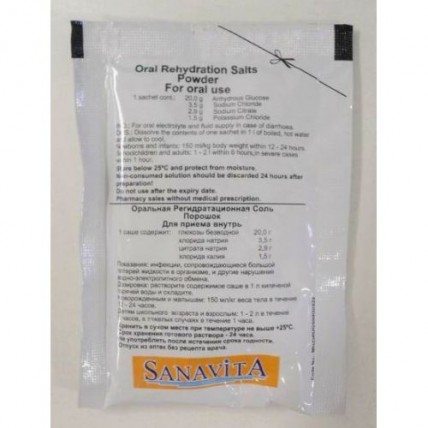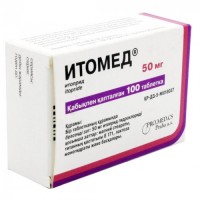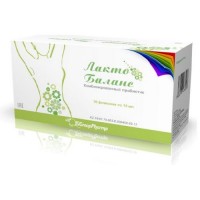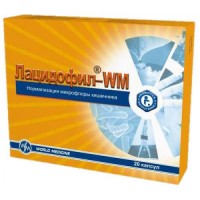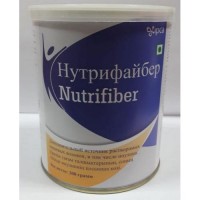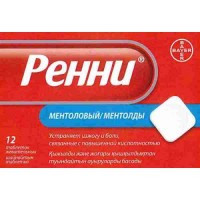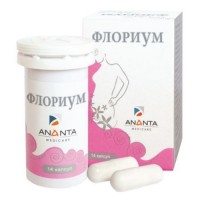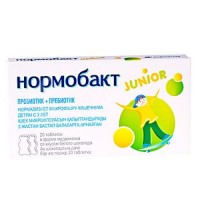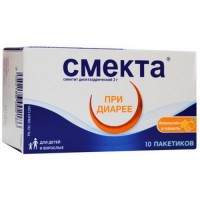ORAL REHYDRATION SALT
the Trade name
Oral rehydration salt
the International unlicensed name
Is not present
the Dosage form
the Powder Structure
active agent glucose of anhydrous 20.0 g, sodium chloride of 3.5 g, potassium chloride of 1.5 g, sodium citrate of 2.9 g.
Description
White powder
Pharmacotherapeutic group
Antidiarrheal drugs. Regidratanta for oral administration
the Code of automatic telephone exchange A07CA
the Pharmacological
Pharmacokinetics Most properties is characterized by a considerable reabsorption in nephron sodium since 4/5 solutes which are in primary urine represent sodium layers. The concentration ability of kidneys and active transport of glucose and amino acids depend on this reabsorption. The most part (99%) of the sodium which underwent filtration rezorbirutsya, and 2/3 these reabsorptions are carried out in a proximal tubule. Process is energetically dependent and provides 1/3 sodium reabsorptions. The others 2/3 are transported through rather wide intracellular spaces of a proximal tubule.
Potassium discharge from an organism is carried out, mainly, through kidneys (90%). Potassium from primary urine reabsorbirutsya completely in a proximal tubule and cosecretes in distal and collective tubules according to requirements of an organism. In the absence of potassium the secretion can be up to 10 mmol/days, and at surplus – to increase to 30 times. At a reabsorption such dependence is absent. Secretion in a distal tubule is in direct dependence on intracellular concentration and is carried out on two mechanisms: by means of kontralumenarno located Na-K-ATP-elements and by means of K+-H+ - the ionic pump located in a lumenarny membrane.
A glucose resorption in digestive tract and its passing to cells are connected with phosphorylation process. Glucose content in blood of capillaries is 2.5-5.5 mmol/l, and in arterial blood its concentration is about 1.0 mmol higher, than in venous.
Glucose – one of substances, completely reabsorbiruyushchikhsya in the kanalchesty device thanks to what the clearance of glucose is equal to zero.
A product of metabolism of sodium citrate is sodium bicarbonate. Oxidation is almost full thanks to what less than 5% of citrate are allocated with urine in an invariable look.
A pharmacodynamics
the Pharmacological effect of drug ORS is caused by effects of its separate components which play an important role in rehydration of an organism, regulate functions of cardiovascular, nervous and secretory systems.
Sodium – the main extracellular cation. In an organism it exists in two forms: the sodium which is subject to exchange (in liquids of a body and about 15% in bones) and the sodium which is not subject to exchange (other 85% in bones). Its total makes about 100 g. From them about 70% fall to the share of the sodium which is subject to exchange and 30% - to a share of the sodium which is not subject to exchange.
Sodium substantially causes the volume and osmotic pressure of extracellular liquid, a charge of cellular membranes, passing of some organic substances through cell membranes, acid-base equilibrium of blood, activity of some enzymes, etc.
Potassium ions maintain automatism and conductivity of heart. At a hyperpotassemia the excitability, conductivity and ability to reduction of a myocardium decreases. Potassium reduces sensitivity of a myocardium to digitalisovy glycosides and antagonizirut the arrhythmia caused by use of toxic doses of digitalisovy prepart. Potassium facilitates reduction of skeletal muscles and interacts with sodium, than maintains isotonicity of cells. Potassium ions are allocated quickly through kidneys and raise a diuresis.
Sodium citrate connects calcium ions in not dissociated form. Has the effect calming the angry mucous membrane of a stomach and antiemetic action, as well as cleaning a stomach.
At disintegration of glucose a significant amount of energy which serves for implementation of functions of an organism is distinguished. Represents a transport form of sugars in an organism. Increases detoksichesky function of a liver and operability of a myocardium and brain.
Indications
- the loss of liquid and saline solution caused by acute or chronic diarrhea.
The route of administration and doses
to Sasha is dissolved in 1 liter of pure (boiled) water. Solution is prepared just before use. (Before use to cool).
To children of 6 years and the adult:
1 - 2 sachets within 6 hours. In cases of ongoing diarrhea - within 1 hour.
To babies:
150 mg/kg of body weight within 12 - 24 hours. To children weighing less than 10 kg - to fill up a lack of liquid with tea or water.
Duration of use of drug is determined by the doctor.
Side effects
- in some cases the vomiting caused by intolerance of potassium
of the Contraindication
- sharp or chronic kidney disease
- a metabolic alkalosis
- pernicious vomiting
- turbidity of consciousness or shock is possible
As use of drug assumes input of the fluid and sodium, conditions of its use for patients with heart failure and hypertensia have to be stipulated.
Medicinal interactions
Effect of cardiac glycosides can be reduced therefore at simultaneous use of drug and cardiac glycosides it is necessary to control potassium level in blood.
The special
instructions Diarrhea can be a symptom of a serious illness. In steady diarrhea and also at threat of diarrheal shock the consultation of the doctor is necessary.
Because of the high content of glucose, drug can be used by patients - diabetics only after consultation with the doctor. 1 sachet of a complex for rehydration contains 1.7 carbohydrate units.
The period of pregnancy and a lactation
Use of drug for rehydration is possible.
Influence of medicine on ability to run the vehicle and potentially dangerous mechanisms
Use of drug does not affect ability to run the vehicle and potentially dangerous mechanisms
Overdose
in case of accidental intoxication powder of Oral rehydration salt or intake of solution of Oral rehydration salt with excessive concentration compensation of hyperosmotic effect in digestive tract a large amount of water is necessary.
The form of release and packing
Powder of 27.9 g in a sachet,
On 100 sachets
Storage conditions
to Store in packing at a temperature not above +25 °C
Ready solution to store only in the fridge
to Store out of children's reach!
A period of storage
3 years
the Period of storage of ready solution – 24 hours
not to apply after an expiration date
Prescription status
Without prescription of the doctor
the Trade name
Oral rehydration salt
the International unlicensed name
Is not present
the Dosage form
the Powder Structure
active agent glucose of anhydrous 20.0 g, sodium chloride of 3.5 g, potassium chloride of 1.5 g, sodium citrate of 2.9 g.
Description
White powder
Pharmacotherapeutic group
Antidiarrheal drugs. Regidratanta for oral administration
the Code of automatic telephone exchange A07CA
the Pharmacological
Pharmacokinetics Most properties is characterized by a considerable reabsorption in nephron sodium since 4/5 solutes which are in primary urine represent sodium layers. The concentration ability of kidneys and active transport of glucose and amino acids depend on this reabsorption. The most part (99%) of the sodium which underwent filtration rezorbirutsya, and 2/3 these reabsorptions are carried out in a proximal tubule. Process is energetically dependent and provides 1/3 sodium reabsorptions. The others 2/3 are transported through rather wide intracellular spaces of a proximal tubule.
Potassium discharge from an organism is carried out, mainly, through kidneys (90%). Potassium from primary urine reabsorbirutsya completely in a proximal tubule and cosecretes in distal and collective tubules according to requirements of an organism. In the absence of potassium the secretion can be up to 10 mmol/days, and at surplus – to increase to 30 times. At a reabsorption such dependence is absent. Secretion in a distal tubule is in direct dependence on intracellular concentration and is carried out on two mechanisms: by means of kontralumenarno located Na-K-ATP-elements and by means of K+-H+ - the ionic pump located in a lumenarny membrane.
A glucose resorption in digestive tract and its passing to cells are connected with phosphorylation process. Glucose content in blood of capillaries is 2.5-5.5 mmol/l, and in arterial blood its concentration is about 1.0 mmol higher, than in venous.
Glucose – one of substances, completely reabsorbiruyushchikhsya in the kanalchesty device thanks to what the clearance of glucose is equal to zero.
A product of metabolism of sodium citrate is sodium bicarbonate. Oxidation is almost full thanks to what less than 5% of citrate are allocated with urine in an invariable look.
A pharmacodynamics
the Pharmacological effect of drug ORS is caused by effects of its separate components which play an important role in rehydration of an organism, regulate functions of cardiovascular, nervous and secretory systems.
Sodium – the main extracellular cation. In an organism it exists in two forms: the sodium which is subject to exchange (in liquids of a body and about 15% in bones) and the sodium which is not subject to exchange (other 85% in bones). Its total makes about 100 g. From them about 70% fall to the share of the sodium which is subject to exchange and 30% - to a share of the sodium which is not subject to exchange.
Sodium substantially causes the volume and osmotic pressure of extracellular liquid, a charge of cellular membranes, passing of some organic substances through cell membranes, acid-base equilibrium of blood, activity of some enzymes, etc.
Potassium ions maintain automatism and conductivity of heart. At a hyperpotassemia the excitability, conductivity and ability to reduction of a myocardium decreases. Potassium reduces sensitivity of a myocardium to digitalisovy glycosides and antagonizirut the arrhythmia caused by use of toxic doses of digitalisovy prepart. Potassium facilitates reduction of skeletal muscles and interacts with sodium, than maintains isotonicity of cells. Potassium ions are allocated quickly through kidneys and raise a diuresis.
Sodium citrate connects calcium ions in not dissociated form. Has the effect calming the angry mucous membrane of a stomach and antiemetic action, as well as cleaning a stomach.
At disintegration of glucose a significant amount of energy which serves for implementation of functions of an organism is distinguished. Represents a transport form of sugars in an organism. Increases detoksichesky function of a liver and operability of a myocardium and brain.
Indications
- the loss of liquid and saline solution caused by acute or chronic diarrhea.
The route of administration and doses
to Sasha is dissolved in 1 liter of pure (boiled) water. Solution is prepared just before use. (Before use to cool).
To children of 6 years and the adult:
1 - 2 sachets within 6 hours. In cases of ongoing diarrhea - within 1 hour.
To babies:
150 mg/kg of body weight within 12 - 24 hours. To children weighing less than 10 kg - to fill up a lack of liquid with tea or water.
Duration of use of drug is determined by the doctor.
Side effects
- in some cases the vomiting caused by intolerance of potassium
of the Contraindication
- sharp or chronic kidney disease
- a metabolic alkalosis
- pernicious vomiting
- turbidity of consciousness or shock is possible
As use of drug assumes input of the fluid and sodium, conditions of its use for patients with heart failure and hypertensia have to be stipulated.
Medicinal interactions
Effect of cardiac glycosides can be reduced therefore at simultaneous use of drug and cardiac glycosides it is necessary to control potassium level in blood.
The special
instructions Diarrhea can be a symptom of a serious illness. In steady diarrhea and also at threat of diarrheal shock the consultation of the doctor is necessary.
Because of the high content of glucose, drug can be used by patients - diabetics only after consultation with the doctor. 1 sachet of a complex for rehydration contains 1.7 carbohydrate units.
The period of pregnancy and a lactation
Use of drug for rehydration is possible.
Influence of medicine on ability to run the vehicle and potentially dangerous mechanisms
Use of drug does not affect ability to run the vehicle and potentially dangerous mechanisms
Overdose
in case of accidental intoxication powder of Oral rehydration salt or intake of solution of Oral rehydration salt with excessive concentration compensation of hyperosmotic effect in digestive tract a large amount of water is necessary.
The form of release and packing
Powder of 27.9 g in a sachet,
On 100 sachets
Storage conditions
to Store in packing at a temperature not above +25 °C
Ready solution to store only in the fridge
to Store out of children's reach!
A period of storage
3 years
the Period of storage of ready solution – 24 hours
not to apply after an expiration date
Prescription status
Without prescription of the doctor
